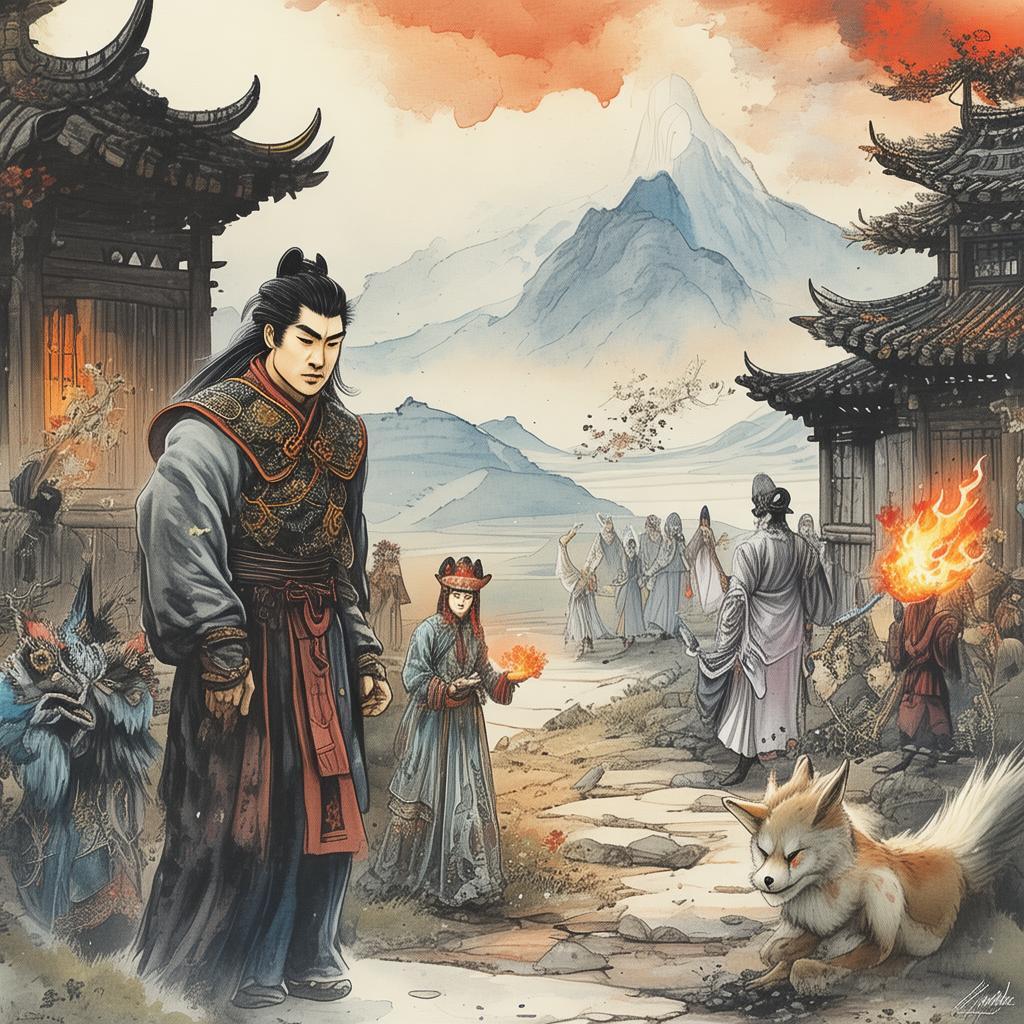Whispers of Redemption: The Bard's Last Lament
In the quaint village of Eldridge, nestled between the whispering winds of the ancient forests and the murmuring rivers, there stood a grand old inn known as the Moonlit Lament. It was a place where tales of the past mingled with whispers of the future, and the walls themselves seemed to hold secrets as old as time.
The inn's most famous resident was a bard named Lysander, a man whose songs were said to be the voice of the earth itself. His melodies could soothe the storm-tossed soul or stir the sleeping lion. But Lysander was no ordinary bard; he was a guardian of the village's dark history, a keeper of the whispers that echoed through the ages.
Lysander's tale was one of tragedy and redemption. He was born under a blood-red moon, a sign that foretold his fate as a wanderer, a bard without a home, forever bound to the melodies that would become his legacy. As he grew older, he learned the ancient songs of the land, songs that spoke of a time when the line between the living and the dead was thin, and the spirits of the past sought to communicate through the voices of the chosen.
One fateful evening, as the village prepared for the Harvest Festival, a mysterious letter arrived at the inn. It was addressed to Lysander and bore the seal of the old, forgotten bloodline of the village's founders. The letter spoke of a betrayal, a hidden truth, and a melody that held the key to unlocking a family secret that had been buried for generations.
The letter read:
"O Lysander of the Moonlit Lament, I beseech you to play the melody I have written. It is the key to redemption, the truth that binds us all. Only through the voices of the past can we understand the future. Do this for the sake of your soul, and the souls of those who have yet to be born."
Intrigued and burdened by the weight of his destiny, Lysander took up the melody. It was a haunting piece, filled with the sorrow of lost love and the anger of a wronged spirit. As he sang, the villagers felt the chill of the ancient woods closing in on them, the whispers of the dead growing louder, almost tangible.
The night of the festival was a night of revelation. As Lysander's voice reached its crescendo, a vision of the past unfolded before the eyes of the villagers. They saw the betrayal, the murder, and the heartbreak that had festered for centuries, hidden beneath the layers of time.
It was revealed that the letter had been sent by a descendant of the village's founders, a woman named Elara, who had discovered the truth about her ancestors' crimes. She had sought Lysander, the chosen one, to help her break the curse that had been cast upon her family.
Elara had been born with a gift, a gift to communicate with the spirits. But the burden was too heavy for her to bear alone. She needed Lysander's voice to amplify her own, to reach the ears of the spirits who had been silenced for so long.
With the truth now revealed, the spirits began to release their grip on the living. The villagers, who had been living with the weight of the past, felt the chains of guilt and sorrow lift from their shoulders. The festival turned into a celebration of forgiveness and healing, a testament to the power of truth and the strength of the human spirit.
Lysander, the keeper of the whispers, found his redemption in Elara's hands. He had served his purpose, and now, his melodies would no longer be a source of sorrow but a beacon of hope.

In the end, as the first light of dawn broke through the morning mist, the villagers gathered around the inn, their faces alight with hope and gratitude. They had listened to the story of the past, and in doing so, they had become a part of the story of the future.
Lysander's final lament, the melody that had brought them all together, became a legend. It was a reminder that the voices of the past would always be there, waiting to be heard, to guide us through the darkest of times, and to lead us to redemption.
The Moonlit Lament continued to be a place of tales and whispers, a sanctuary for those who sought the truth, for those who knew that sometimes, the greatest power lies in the voices of the dead, speaking through the living.
✨ Original Statement ✨
All articles published on this website (including but not limited to text, images, videos, and other content) are original or authorized for reposting and are protected by relevant laws. Without the explicit written permission of this website, no individual or organization may copy, modify, repost, or use the content for commercial purposes.
If you need to quote or cooperate, please contact this site for authorization. We reserve the right to pursue legal responsibility for any unauthorized use.
Hereby declared.









